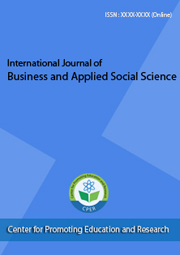current
Table of Contents
Articles
Author(s): Aljwhrh Abdalaziz Almtrf
Abstract:
The rapid integration of generative artificial intelligence (AI) into business decision-making has introduced unprecedented ethical challenges for which existing governance frameworks are insufficient. This study investigates these challenges by conducting a literature review and framework analysis focused on the ethical implications of generative AI in corporate contexts. Key findings reveal significant algorithmic risks including bias, transparency deficits, privacy violations, and autonomy erosion that threaten stakeholder trust and organizational integrity. To address these issues, the research develops a novel multi-dimensional analysis framework that quantitatively evaluates ethical alignment in the implementation of generative AI across five domains, providing an empirical measurement approach not previously available. Based on this foundation, the study proposes an Ethical AI Governance Framework (EAGF) structured around five interlinked dimensions, emphasizing accountability structures, risk assessment protocols, and stakeholder engagement mechanisms. Finally, the research identifies implementation considerations—such as cultural transformation, resource allocation, and phased deployment that are critical to achieving sustainable and ethically responsible AI governance in contemporary business organizations.






